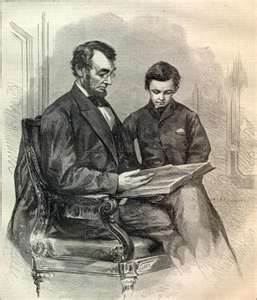The Life and Legacy of Abraham Lincoln
Part 2: Up through the Ranks
The following year, Lincoln opened his own law practice, with William Herndon (and the two would remain friends for the rest of Lincoln's life). Herndon and Lincoln weren't willfully successful or particularly well paid. In order to earn enough money to feed his family and keep his house, Lincoln continued to travel on the state's legal circuit. Lincoln returned to politics indirectly in 1844, campaigning for the Whig presidential nominee, Henry Clay (who lost the election to Democrat James K. Polk). Lincoln's direct return to politics came in 1846, when he ran for the U.S. House of Representatives as a Whig candidate and won. His second child, Edward, was born that same year. After the election, Lincoln and his family moved to Washington, D.C. It was a momentous time to be part of the U.S. Government, which was at war with Mexico. Lincoln's stay in the House was a short one, although he did take a few opportunities to speak out against the Mexican-American War. He returned to Springfield after just one term, taking up his law practice again and returning to the traveling circuit. He also served as a company attorney for the Illinois Central Railroad. Lincoln found further recognition by this time, taking on high-profile business clients like banks and insurance companies. Edward died in 1850 at age 3. Abraham's and Mary's third child, William, was born later that year; and Lincoln's last son, Thomas (called Tad), arrived in 1853. The following year, Lincoln swung back into political action, campaigning against the Kansas-Nebraska Act and the idea of "Popular Sovereignty." This brought him into direct contact with one of Illinois' brightest stars, Stephen A. Douglas, the author of the Act and the idea of "popular sovereignty," that the question of whether to allow slavery in a new territory or state could be determined by a direct popular vote of the residents. Lincoln won another term in the Illinois legislature but did not accept, instead voicing his preference for a seat in the U.S. Senate. (At that time, Senators were chosen by the state legislatures.) He was not chosen. In 1856, Lincoln joined the newly formed Republican Party, which had as its members many of the defunct Whig Party. Opposition to "popular sovereignty" was one of the Republican Party's main initiatives. The first presidential candidate of the new party was John C. Frémont. At the party's national convention, in Philadelphia, Lincoln received much support for being the vice-presidential candidate. The eventual second place on the ticket went to New Jersey's William Dayton. Despite his success working for businesses, Lincoln retained his duties as a defense attorney, and in 1858 gained a bit of notoriety by using a farmer's almanac to disprove eyewitness testimony: One of the main complainants against his client said that he easily identified the accused because of the full moonlight; Lincoln, however, read from the almanac that the night in question was too dark for any kind of visible identification. The result was acquittal. 
That same year, he won his party's nomination for Senate. His opponent was Stephen A. Douglas. Lincoln gave the first of his most famous speeches that year, at the state convention. Speaking out on the clear conflict of slavery, he said that "A house divided against itself cannot stand." He and Douglas criss-crossed the state, engaging in a series of high-profile debates, the text of which were printed not only in Illinois newspapers but also in other states. In the end, the Illinois state legislature chose Douglas for the Senate seat. Lincoln, however, gained national fame for his efforts. Next page > Leader of the Free World > Page 1, 2, 3, 4 |
|
Social Studies for Kids
copyright 2002–2024
David White



 A married man, Lincoln decided not to seek re-election in the Assembly but instead make a run for the U.S. Congress. He did so, on the Whig Party, but did not win. However, in that same year, 1843, his first child, Robert, was born.
A married man, Lincoln decided not to seek re-election in the Assembly but instead make a run for the U.S. Congress. He did so, on the Whig Party, but did not win. However, in that same year, 1843, his first child, Robert, was born.
